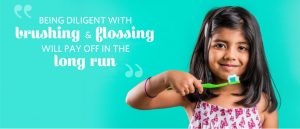Brushing your teeth is an everyday task and comes naturally (to most). As parents, we know how hard we struggle to make sure that our children have done their part in cleaning their teeth. It may seem like some sort of phase that our child is going through, but as you start looking at the facts, the truth can be quite daunting. Tooth decay is 20 times more common than diabetes and five times more common in children than childhood asthma. It should be an important focus of our attention when maintaining childhood health. It’s vital that we establish a pattern for children early on to ensure good oral health.
According to the expert:
“Starting to brush early in life helps children make brushing a part of their daily routine. As a matter of fact, we advise parents to wipe their infant’s gums with a soft wet cloth or gauze after feeding them and start to brush and clean as soon as the first couple of teeth erupt,” said Gayathri Raju, D.M.D., a pediatric dentist at Tioga Dental. “This way the child becomes accustomed to parents brushing their teeth and over time there is less resistance.”
For infants and toddlers, Raju advises having them lie in your lap facing you, supporting their head and start brushing. With older children, brushing and flossing after breakfast and before going to bed is ideal for good oral health. Also, Raju suggests commercially available flavored toothpastes that can make brushing a fun experience.

What about when braces are involved?
Once children get braces, the areas of the teeth and gums that are close to or under wires and brackets are more difficult to clean. When teeth aren’t cleaned carefully, food particles can get trapped in these areas. This allows dental plaque to accumulate, which increases the risk of tooth decay and gum disease.
“It is imperative that children with braces maintain good oral hygiene. All the extra metal prevent access to the tooth surface— creating a challenge to brushing and flossing,” Raju said. “Being diligent with brushing and flossing will pay off in the long run because otherwise you may end up with straight teeth and cavities.”
Raju also suggests that children with braces can add a fluoride mouth rinse to their routine to offer an extra layer of protection.
Overall, good oral hygiene habits will contribute to a child’s overall physical and mental wellness. When we don’t brush and floss regularly, a domino effect begins to occur, Raju said.
“When we don’t brush, plaque will accumulate and bacteria will continue to thrive and overwhelm your defenses tilting the balance in favor of cavities and gum disease to develop. White spots, cavities, bleeding gums, tartar buildup and bad breath are symptoms of this imbalance. The mouth is truly the mirror for your body and having healthy teeth and gums are part of your overall general health.”
What can you do?
A diet high in sugars, inconsistent oral hygiene and the type of bacteria that thrives in the oral cavity can create the “perfect storm,” resulting in decay and the burden of fixing the damage can be stressful on your health, time and resources.
Raju recommends establishing a dental home for your child with a pediatric dentist early to help parents to concentrate on the preventive aspect of dental care, thus keeping all the complex problems associated with childhood decay at bay.

